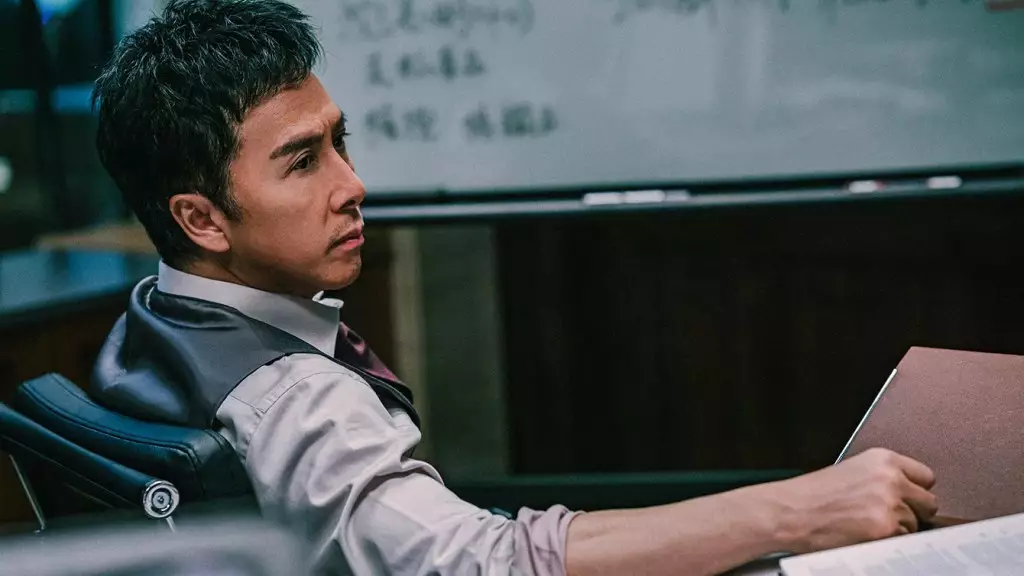Donnie Yen’s “The Prosecutor” attempts to weave an intricate narrative that straddles the line between action-packed entertainment and a critique of the legal system in Hong Kong. The film presents a unique blend of courtroom drama and action, all while highlighting Yen’s desire to expand his repertoire beyond traditional martial arts roles. However, the execution leaves much to be desired, resulting in a movie that may engage fans but ultimately underwhelms expectations.
In “The Prosecutor,” Yen plays Fok Chi Ho, a police officer disheartened by a legal system that seems to favor the guilty rather than the innocent. His transition from cop to prosecutor is a pivotal element of the film, as it lays the foundation for the challenges he faces in his new role. However, the movie frequently portrays Fok as an archetype rather than a fully developed character. While he is depicted as an honorable individual who mingles with the masses, this character depth often falters under the weight of legal jargon and procedural intricacies that distract from his personal growth.
The film’s direction, helmed by Yen himself, feels as if it is caught in a dilemma. It seeks to portray Fok as a man of the people, emphasizing his humble lifestyle and sincere dedication to justice. Yet, this noble intent often gets lost amid extended courtroom scenes that hammer home legal details without sparking emotional engagement. Rather than evoking empathy, Fok’s struggles risk alienating viewers who may not be familiar with the complexities of the legal system being laid out with almost relentless exposition.
Balancing Action and Advocacy
While “The Prosecutor” is built around courtroom drama, the film also attempts to appease Yen’s dedicated action fanbase. It includes several action sequences designed to remind viewers of Yen’s past roles as a master martial artist. Yet, these segments come off as more of an afterthought rather than integral to the plot. In fact, many action scenes revolve around younger, agile characters, leaving Fok to engage primarily in verbal duels rather than physical confrontations. There’s irony in a film with such extensive action branding that often sees its lead character sitting behind a desk rather than showcasing the martial prowess for which Yen is renowned.
The film’s initial burst of frenetic energy during a drug bust serves as a promising introduction, positioning Fok as a dedicated officer. However, such moments are fleeting, leading to an imbalance between action and legal drama that can leave audiences frustrated. Rather than blending these two aspects seamlessly, the film struggles with a tonal clash—a curious choice for a narrative designed to neither fully embrace nor decisively abandon the action genre.
The context in which “The Prosecutor” is set adds a layer of complexity that becomes increasingly significant as the film progresses. With recent political developments in Hong Kong, particularly regarding the National Security Law, “The Prosecutor” underscores the fragility of the city’s legal system. The themes explored in the movie resonate deeply in contemporary discussions about justice and governmental authority.
Although the film does not explicitly address current political tensions, its emphasis on the importance of justice and due process feels resonant. However, the weighty legal discussions often overshadow these themes, resulting in a saturation of legalese that may bewilder viewers, particularly those unfamiliar with Hong Kong’s laws. The overly detailed courtroom procedures can feel like a barrier instead of an engaging plot element, serving as a detriment to the overall narrative.
A Missed Opportunity for Resonance
Ultimately, “The Prosecutor” bears the hallmark of a film with good intentions caught in the struggles of self-identification. It tries to balance action and legal drama while reflecting upon significant societal issues, yet it often ends up losing sight of its core narrative. While Yen’s performance is solid, the film’s script weighs heavily on exposition and courtroom procedures rather than delivering a captivating story anchored in emotional resonance.
The climax does attempt to redeem some lost ground through a visually impressive action scene, but by then, most viewers may find themselves looking for the film’s deeper meaning amid a barrage of dialogue and unrelenting legal facts. “The Prosecutor” stands as an ambitious attempt to blend genres and comment on pressing social issues, yet it ultimately serves as a reminder of the difficulties inherent in maintaining focus amidst diverse thematic aspirations. In striving for both action and advocacy, the film may have inadvertently compromised the very impact it sought to achieve.
